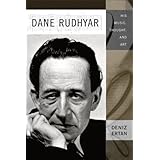
Average Reviews:

(More customer reviews)This biography of a true "Renaissance man" was long overdue, and for the Rudhyar devotee it will be most welcome. Its primary focus is Ertan's exposition of the philosophical underpinnings of Rudhyar's art and life. Most conspicuously absent, however (or, anyway overshadowed by the philosophical element and Ertan's perhaps overzealous evangelizing for Rudhyar's importance as a painter), is a real in-depth exploration of his music.
In short, those who are looking for a further exploration of Rudhyar's musical language and rhetoric will be disappointed. Those whose musical appetites had been whetted by the Rudhyar chapter in Carol Oja's fine "Making Music Modern" will not find this biography to be an adequate "main course". I concur with Musical Times reviewer Kevin O'Connell that the inclusion of a CD would have greatly enhanced the value of book.
Alas, this fine study is not likely to draw many newcomers into the Rudhyar fold. Surely Rudhyar's most important contributions were in the areas of (1) astrology and (2) music.
(1) I admire Ertan's efforts to make a case for Rudhyar's contribution to modern philosophy, but there seems to be a kind of apology in the dense writing - as though one ought to "forgive" Rudhyar for his philosophical "backsliding" into the occult. In this regard, I would say: Rudhyar is Rudhyar; take him or leave him. He's not Nietsche or Wittgenstein.
(2) Apparently Bob Gilmore, the fine biographer of Harry Partch and Claude Vivier, had also been working on a Rudhyar biography a few years ago, assumedly focused mainly on Rudhyar as a composer. One hopes that the publication of Ertan's excellent book will inspire Gilmore to "balance the scales". Regarding CDs of Rudhyar's music, I've just learned that pianist Richard Cameron-Wolfe will release his second Rudhyar recording in late 2010, to include the Fourth Pentragram, Tetragram #9, and the 1977 Three Cantos. (His 2003 "Paris X" album contains two early Paris works plus the Tetragrams ##3 & 8.)
Click Here to see more reviews about: Dane Rudhyar: His Music, Thought, and Art (Eastman Studies in Music)
Dane Rudhyar (1895-1985) was a unique figure in twentieth-century American culture: a composer, thinker, painter, poet, novelist, and expert on astrology. His thought and work transcended disciplinary boundaries, integrating perspectives that were, and often still are, generally pursued in isolation from each other. Rudhyar's musical compositions -- such as the remarkable Three Paeans for piano -- were often described at the time as ultramodern and deeply philosophical. Noted music critic Nicholas Slonimsky described Rudhyar's music as "searching and challenging . . . the explanation of a puzzle of human existence." Rudhyar's sometimes startling paintings and his brilliantly articulate prose writings on a variety of subjects reached outward to pre-Renaissance and non-Western traditions. Novelist Henry Miller praised Rudhyar's ability "to show the relation between the parts, and finally to relate the parts to the whole. . . . He is so many things precisely because his sight is always focused on the central core, on the source from which all flows." Dane Rudhyar: His Music, Thought, and Art is the first full-length study of this remarkable polymath and citizen of the world and universe. The book is enriched with numerous color illustrations of Rudhyar's paintings and with examples drawn from his music and writings.

No comments:
Post a Comment